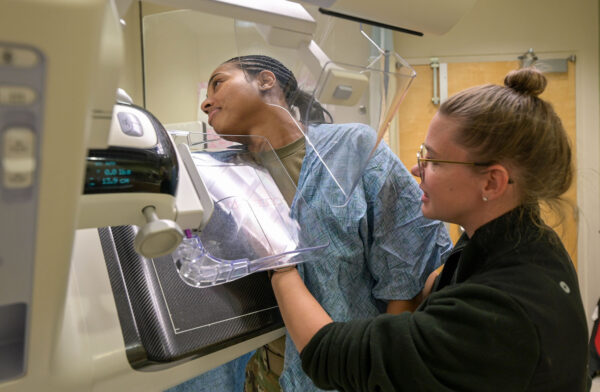
U.S. Air Force Staff Sgt. April Grant, 633d Mammography Clinic noncommissioned officer in charge, left, and Jaime Radik, 633d Mammography Clinic lead mammography technician, right, demonstrates how mammograms are performed at Joint Base Langley-Eustis (Photo: U.S. Air Force Airman 1st Class Ian Sullens)
Veterans exposed to burn pits and other toxins now have expanded eligibility for breast cancer screenings and mammograms, regardless of age, family history, or enrollment in VA health care, thanks to the Department of Veterans Affairs’ recent initiative. This development comes as welcome news to countless Veterans, particularly for those under 40 years old who may have been at risk but didn’t meet the traditional screening criteria.
This expansion applies to Veterans, regardless of age, symptoms, family history, or enrollment in VA health care. The move comes as a result of the Dr. Kate Hendricks Thomas SERVICE Act, which was passed last year in honor of former Marine, Kate Hendricks Thomas, who tragically lost her life to Stage 4 breast cancer in April 2022.
Under the new protocol, eligible Veterans will be assessed for breast cancer risk through a questionnaire exploring toxic exposures, family medical history, and other potential risk factors. Those meeting the criteria will receive mammograms as clinically appropriate.
This expansion aligns with President Biden’s Unity Agenda and the Biden Cancer Moonshot initiative, aiming to prevent over 4 million cancer deaths by 2047 and improve cancer detection and treatment.
Veterans who served in specific areas overseas at specific times, including Iraq, Kuwait, Saudi Arabia, Oman, Qatar, Afghanistan, Djibouti, Syria, Jordan, Egypt, Lebanon, and Yemen, are eligible for the new screenings. The Airborne Hazards and Open Burn Pit Registry will determine eligibility for other locations and time periods.
Early detection of breast cancer significantly improves survival rates by approximately 20% to 30%, making this expansion vital for the health and well-being of Veterans.
Breast cancer is also recognized as a presumptive condition under the PACT Act, offering care and benefits to eligible Veterans. Since its enactment, the PACT Act has provided over $1.6 billion in benefits to Veterans and their survivors, with over 4 million Veterans receiving VA’s new toxic exposure screening.
Veterans interested in receiving a breast cancer risk assessment can contact their VA primary care provider or their local VA medical center.













